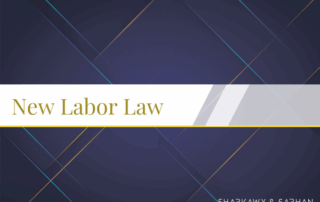14th of January 2018
New Requirements for Contractors Registration & Classification Rules
Keywords: Infrastructure & Power, Commercial
Targeting works related to new and renewable energy generation and distribution plants.
Following a spate of high-profile renewable energy deals in 2017, new measures by the government to strengthen the renewable energy market continue to be made. On 3 January 2018, the Ministry of Housing and Urban Communities issued a new decree 1114/2017 (the “New Decree”), amending decree 162/2013 (the “Old Decree”) which was issued back in 2013. These amendments introduce new, more lenient requirements for contractors seeking registration with the Egyptian Federation for Construction and Building Contractors (the “EFCBC”), for works related to new and renewable energy generation and distribution plants.
Background:
The EFCBC classifies construction works in Egypt into five main specializations. For example, a specialization for Building Works (Specialization A), another one for Electromechanical, Electronic and Communication Networks (Specialization E)…etc. Under each specialization, a contractor is placed under a certain grade, the lowest grade can be as low as seven (7) or (6), as the case may be, and the highest grade being number one (1). The grade of the contractors with the CU determines the value of Construction works that can be carried out by such contractors. Contractors are typically graded according to several factors including: size of paid up capital, number of engineers, years of expertise, value of equipment, previous experience and projects of the contractor within the past five (5) years…etc. For more details, please consult our previous update regarding construction licensing.
New Amendments:
• The new requirements introduce a new subcategory under Specialization E for new and renewable energy generation and distribution plants. The amendment limits the available grades of registration for works related to new and renewable energy generation and distribution plants to the first, second, third grades only.
• The New Decree reduces the required minimum experience for registration in the first, second, and third grades. The New Decree decreases the required experience for registration at the first grade from 15 years to 3 years, for registration at the second grade from 10 years to two years, and for registration at the third grade from 6 years to none at all.
• Further, the value of the equipment that the company is required to own has decreased significantly; for the first grade, the value of the equipment decreased from EGP6’000’000 to EGP2’000’000, for the second grade from EGP3’000’000 to EGP1’500’000, and for the third grade from EGP1’500’000 to EGP1’000’000.
What will change in the market?
The New Decree opens the door for a broader segment of investors to register at higher grades. Previously, new investors were forced to register into the sixth grade, because of their lack of experience, which made them only eligible to enter into tenders with a maximum value of EGP1’500’000. Contractors can now register themselves at the third grade to enter tenders of value up to EGP26’000’000, at the second grade to enter tenders of value up to EGP60’000’000, and at the first grade to enter any tender with no maximum value.
Background:
The EFCBC classifies construction works in Egypt into five main specializations. For example, a specialization for Building Works (Specialization A), another one for Electromechanical, Electronic and Communication Networks (Specialization E)…etc. Under each specialization, a contractor is placed under a certain grade, the lowest grade can be as low as seven (7) or (6), as the case may be, and the highest grade being number one (1). The grade of the contractors with the CU determines the value of Construction works that can be carried out by such contractors. Contractors are typically graded according to several factors including: size of paid up capital, number of engineers, years of expertise, value of equipment, previous experience and projects of the contractor within the past five (5) years…etc. For more details, please consult our previous update regarding construction licensing.
New Amendments:
• The new requirements introduce a new subcategory under Specialization E for new and renewable energy generation and distribution plants. The amendment limits the available grades of registration for works related to new and renewable energy generation and distribution plants to the first, second, third grades only.
• The New Decree reduces the required minimum experience for registration in the first, second, and third grades. The New Decree decreases the required experience for registration at the first grade from 15 years to 3 years, for registration at the second grade from 10 years to two years, and for registration at the third grade from 6 years to none at all.
• Further, the value of the equipment that the company is required to own has decreased significantly; for the first grade, the value of the equipment decreased from EGP6’000’000 to EGP2’000’000, for the second grade from EGP3’000’000 to EGP1’500’000, and for the third grade from EGP1’500’000 to EGP1’000’000.
What will change in the market?
The New Decree opens the door for a broader segment of investors to register at higher grades. Previously, new investors were forced to register into the sixth grade, because of their lack of experience, which made them only eligible to enter into tenders with a maximum value of EGP1’500’000. Contractors can now register themselves at the third grade to enter tenders of value up to EGP26’000’000, at the second grade to enter tenders of value up to EGP60’000’000, and at the first grade to enter any tender with no maximum value.

New Requirements for Contractors Registration & Classification Rules
14th of January 2018
Keywords: Infrastructure & Power, Commercial
Targeting works related to new and renewable energy generation and distribution plants.
Following a spate of high-profile renewable energy deals in 2017, new measures by the government to strengthen the renewable energy market continue to be made. On 3 January 2018, the Ministry of Housing and Urban Communities issued a new decree 1114/2017 (the “New Decree”), amending decree 162/2013 (the “Old Decree”) which was issued back in 2013. These amendments introduce new, more lenient requirements for contractors seeking registration with the Egyptian Federation for Construction and Building Contractors (the “EFCBC”), for works related to new and renewable energy generation and distribution plants.
Background:
The EFCBC classifies construction works in Egypt into five main specializations. For example, a specialization for Building Works (Specialization A), another one for Electromechanical, Electronic and Communication Networks (Specialization E)…etc. Under each specialization, a contractor is placed under a certain grade, the lowest grade can be as low as seven (7) or (6), as the case may be, and the highest grade being number one (1). The grade of the contractors with the CU determines the value of Construction works that can be carried out by such contractors. Contractors are typically graded according to several factors including: size of paid up capital, number of engineers, years of expertise, value of equipment, previous experience and projects of the contractor within the past five (5) years…etc. For more details, please consult our previous update regarding construction licensing.
New Amendments:
• The new requirements introduce a new subcategory under Specialization E for new and renewable energy generation and distribution plants. The amendment limits the available grades of registration for works related to new and renewable energy generation and distribution plants to the first, second, third grades only.
• The New Decree reduces the required minimum experience for registration in the first, second, and third grades. The New Decree decreases the required experience for registration at the first grade from 15 years to 3 years, for registration at the second grade from 10 years to two years, and for registration at the third grade from 6 years to none at all.
• Further, the value of the equipment that the company is required to own has decreased significantly; for the first grade, the value of the equipment decreased from EGP6’000’000 to EGP2’000’000, for the second grade from EGP3’000’000 to EGP1’500’000, and for the third grade from EGP1’500’000 to EGP1’000’000.
What will change in the market?
The New Decree opens the door for a broader segment of investors to register at higher grades. Previously, new investors were forced to register into the sixth grade, because of their lack of experience, which made them only eligible to enter into tenders with a maximum value of EGP1’500’000. Contractors can now register themselves at the third grade to enter tenders of value up to EGP26’000’000, at the second grade to enter tenders of value up to EGP60’000’000, and at the first grade to enter any tender with no maximum value.
Background:
The EFCBC classifies construction works in Egypt into five main specializations. For example, a specialization for Building Works (Specialization A), another one for Electromechanical, Electronic and Communication Networks (Specialization E)…etc. Under each specialization, a contractor is placed under a certain grade, the lowest grade can be as low as seven (7) or (6), as the case may be, and the highest grade being number one (1). The grade of the contractors with the CU determines the value of Construction works that can be carried out by such contractors. Contractors are typically graded according to several factors including: size of paid up capital, number of engineers, years of expertise, value of equipment, previous experience and projects of the contractor within the past five (5) years…etc. For more details, please consult our previous update regarding construction licensing.
New Amendments:
• The new requirements introduce a new subcategory under Specialization E for new and renewable energy generation and distribution plants. The amendment limits the available grades of registration for works related to new and renewable energy generation and distribution plants to the first, second, third grades only.
• The New Decree reduces the required minimum experience for registration in the first, second, and third grades. The New Decree decreases the required experience for registration at the first grade from 15 years to 3 years, for registration at the second grade from 10 years to two years, and for registration at the third grade from 6 years to none at all.
• Further, the value of the equipment that the company is required to own has decreased significantly; for the first grade, the value of the equipment decreased from EGP6’000’000 to EGP2’000’000, for the second grade from EGP3’000’000 to EGP1’500’000, and for the third grade from EGP1’500’000 to EGP1’000’000.
What will change in the market?
The New Decree opens the door for a broader segment of investors to register at higher grades. Previously, new investors were forced to register into the sixth grade, because of their lack of experience, which made them only eligible to enter into tenders with a maximum value of EGP1’500’000. Contractors can now register themselves at the third grade to enter tenders of value up to EGP26’000’000, at the second grade to enter tenders of value up to EGP60’000’000, and at the first grade to enter any tender with no maximum value.
Key Contacts
Insights
Disclaimer
The information included in this publication/client alert is not legal advice or any other advice. Publications and client alerts on this site are current as of their date of publication and do not necessarily reflect the present law or regulations. Please feel free to contact us should you need any legal advice related to the publication/client alert. Sharkawy & Sarhan (the “Firm”) will not be held liable for any compensatory, special, direct, incidental, indirect, or consequential damages, exemplary damages or any damages whatsoever arising out of or in connection with the use of the data, information or material included in this publication/client alert. This publication/client alert may contain links to third-party websites that are not controlled by the Firm. These third-party links are made available to you as a convenience and you agree to use these links at your own risk. Please be aware that the Firm is not responsible for the content or services offered by and of third-party websites, links as included in the Newsletter nor are we responsible for the privacy policy or practices of third-party websites links included therein.
Authorization of Use
The data, information, and material included in this publication/client alert are solely owned by the Firm. All rights related are reserved under the laws of the Arab Republic of Egypt. No part of this publication/client alert can be redistributed, copied, or reproduced without the prior written consent of the Firm.



